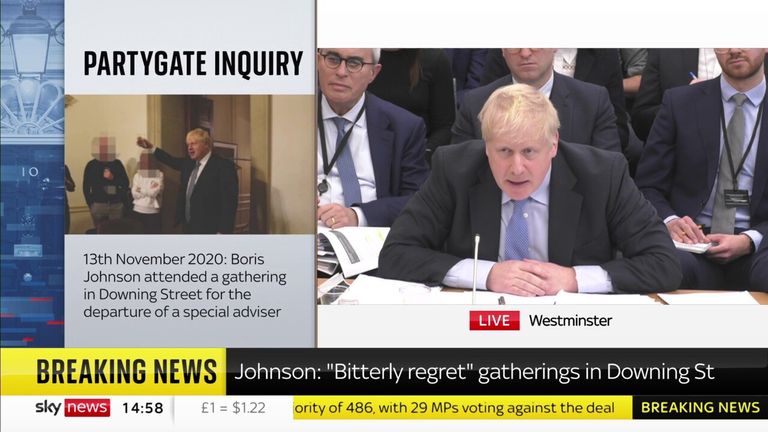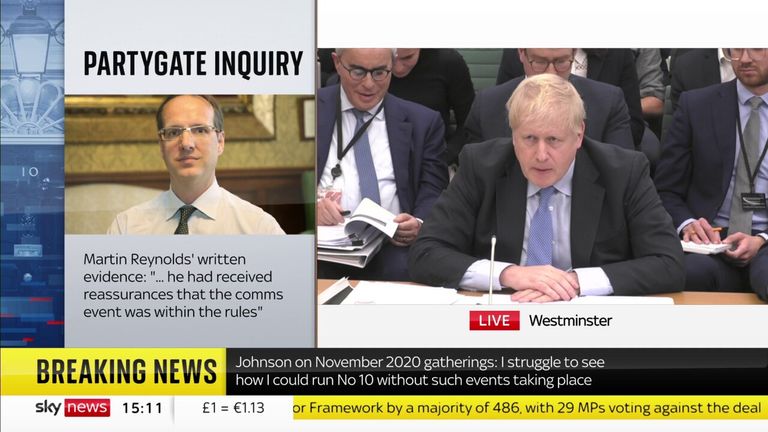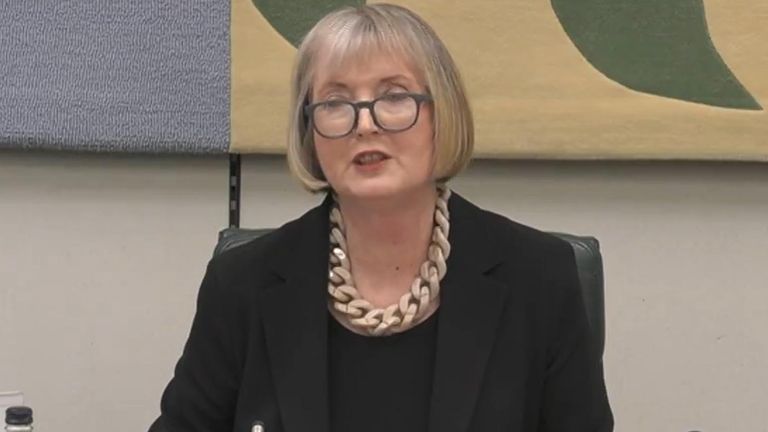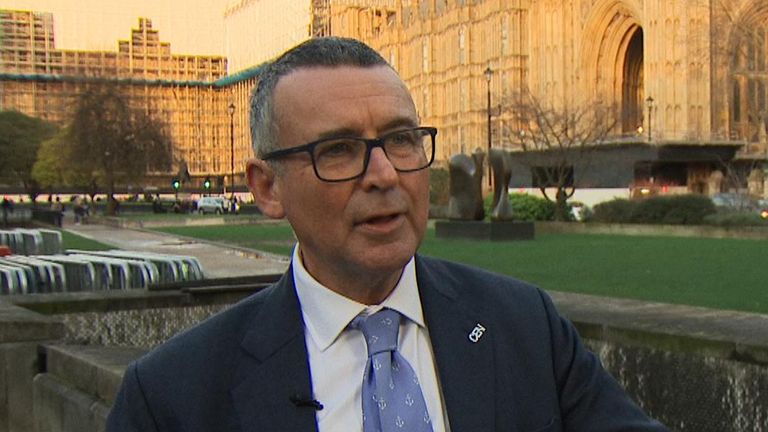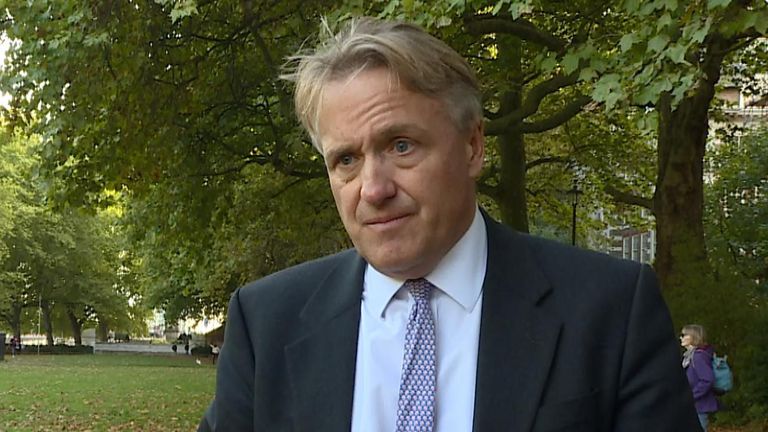The long-awaited appearance of Boris Johnson in front of parliament’s privileges committee took place today, seeing him answer three hours of questions over partygate.
The aim of the committee is to decide if the former prime minister deliberately misled the Commons about what he knew about the lockdown breaking gatherings happening behind the famous black door.
And it was a long, taxing and sometimes tempestuous bunch of exchanges.
Here’s a look at five of the most striking moments from today’s evidence session.
swearing on the bible
In a rare moment at the beginning of the committee, the former prime minister took the King James Bible in hand and read out an oath.
“I swear by almighty God that the evidence I shall give for this committee should be the truth, the whole truth, and nothing but the truth, so help me God,” he said.
This was a highly unusual way to start an evidence session in parliament – it has been more than 10 years since it last happened.
And it meant Mr Johnson’s testimony was subject to the Perjury Act of 1911, meaning lying, or providing a false account, would be a criminal offence.
In his opening statement, the former prime minister sought to reassure the committee – and all of us watching – that he was telling the truth.
“I’m here to say to you, hand on heart, that I did not lie to the House when those statements were made, they were made in good faith and on the basis of what I honestly knew and believed at the time,” he said.
Leaving do ‘absolutely essential’
A number of the events that took place in Downing Street over lockdown – and some of the five attended by Mr Johnson – were leaving two for exiting employees.
They took place at a time when two or more people weren’t allowed to meet up indoors unless it was for essential work purposes, with social distancing maintained as far as possible.
However, Mr Johnson strongly defended such gatherings as essential for his staff.
“I know that people around the country will look at those events and think they look like the very kind of events that we or I were forbidding to everyone else,” he told the committee.
“But I will believe til the day I die that it was my job to thank staff for what they had done, especially during a crisis like COVID, which kept coming back, which seemed to have no end. And when people’s morale did, I ‘m afraid, begin to sink.”
He said it did not matter so much what he thought, but “the most important point is that the police agreed”.
The ex-leader added: “They did not find that my attendance at any of these farewell gatherings was against the rules.
“I obviously did not know at the time that any of these events later escalated beyond what was lawful after I left.”
Johnson loses his cool
There were a few moments during the three-hour session where things got a little tetchy.
But around two hours in was one of the most notable moments, when the former prime minister appeared to lose his temper, again defending the need for gatherings to boost employee morale.
Asked by Labor MP Yvonne Fovargue if he would have advised anyone else in the country to hold a large scale social gathering in the garden, Mr Johnson replied: “It was not a large social gathering. It was, it was, it was a gathering …
“I really must insist this point, people who say that we were partying in lockdown simply do not know what they are talking about. People who say that event was a purely social gathering are quite wrong.
“My purpose there was to thank the staff, to motivate them in what had been a very difficult time and what was also a very difficult day in which the cabinet secretary had just resigned.”
Ms Fovargue pushed him further, asking: “Did you think, Mr Johnson, that exceptions applied in Number 10 to workplace rules and social distancing guidelines that didn’t apply to the hospitals and the care homes? Workplaces that were also operating under incredibly different , difficult and challenging circumstances?
Mr Johnson replied: “Of course not. And that’s why we continued. That’s why we had all the stipulations I’ve discussed at great length… about following the guidance.”
‘You didn’t take proper advice’
The chair of the committee, Labor veteran Harriet Harman, and senior Tory Sir Bernard Jenkin both had questions about the assurances Mr Johnson had received before making statements to parliament that no rules had been broken – the crux of their investigation.
Throughout the evidence session, it became clear the main people who had offered the assurances were two political appointees who had both attended events.
Ms Harman said MPs took the assurances Mr Johnson had received as “serious” after he pointed to them in the Commons, adding: “Would you not expect us to be a bit dismayed to hear that it was not from the senior civil servants, it was from political appointees, that they themselves had doubts about it, it only covered one gathering… and it only covered the rules, it didn’t cover the guidance?
The former prime minister tried to come back, but Ms Harman wasn’t finished, calling the assurances “flimsy”, and adding: “You were there at the time, so it’s a bit hard to understand what the nature of an assurance is when you have been there and seen it with your own eyes.
“I mean, if I was going 100 miles an hour and I saw the speedometer saying 100 miles an hour, it would be a bit odd, wouldn’t it, if I said, somebody assured me that it wasn’t.”
Sir Bernard continued in this vein of questioning, asking Mr Johnson: “The obligation not to mislead parliament is a very serious on any member of parliament, let alone a minister, and it requires the MP or the minister to take due care, doesn’t do you?”
After Mr Johnson agreed, he continued to push Mr Johnson, saying if he had been accused of the same things, “I would want the advice of a lawyer, I would want the advice of somebody really independent and capable”.
Sir Bernard added: “If I was asked to give undertakings that rules and guidance had been followed and there was any doubt about it, there was the most [tiny] scintilla of doubt about it, well, you want to copperplate your assurances by showing that you had taken proper advice.
“Can I put it to Mr. Johnson, you did not take proper advice?”
Mr Johnson dismissed his critic, telling him: “This is complete nonsense. I mean complete nonsense.
“I asked the relevant people. They were senior people. They’d be working very hard. They gave me a… clear account of what had happened.”
Kangaroo court
The final testy exchange involved Tory MP Sir Charles Walker, who took offense to comments made by Mr Johnson and his supporters ahead of the committee session.
He said there had been “a lot of noises of hue and cry about the legitimacy” of the inquiry they were carrying out, and pointed to Conservative titles that had called their efforts, “the Great British stitch up of Boris”.
Sir Charles took Mr Johnson back through the two votes that took place in the Commons to set up the inquiry and appoint his chair.
Pointing to the first, he asked the former prime minister: “The motion was put and there was no vote. And that is a matter of fact. Indeed there wasn’t even a cry of object from anyone. Can you accept that was the married?”
Mr Johnson replied: “Yes, I encouraged people to support it.”
So what about the appointment of Ms Harman as chair, asked Sir Charles. “There were colleagues of ours in the chamber and when the motion was put and the right honorable lady’s name was mentioned, there was not a single cry of object, not one, not even from a little mouse scuttling across the floor, not a single cry of object,” he said.
“Can you accept that as well?”
“Of course,” said Mr Johnson.
Sir Charles accused his supports of “wanting it both ways”, adding: “They’re hoping that the evidence you’ve given in 52 pages will exonerate you by giving you a clean bill of health and that’s what your desired outcome is.
Read more:
Six things we learned from evidence published by the committee
Top aid questioned Johnson’s plan to say ‘all guidance was followed’
“But just in case that doesn’t happen, there has been a concerted effort to de-legitimize the committee – to call as a kangaroo court.”
Mr Johnson repeated he had “anxieties” about the committee, but insisted he had “respect” for the work of the committee.
He concluded: “For better or worse, whatever the issues of fairness that I may have raised in my submission, this is the body that decides on standards and privileges.”
Now, we all await its conclusions.

